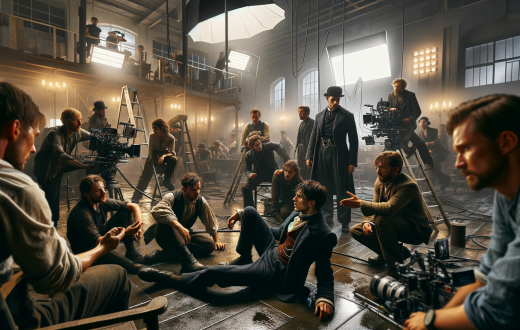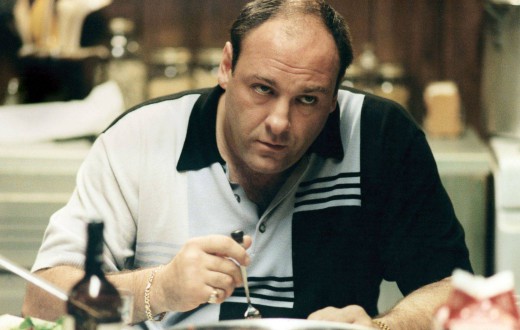There’s a well-worn cliché you’ve probably heard before about writing, usually uttered by a clueless coffee shop Shakespeare who spends more time on social media than Microsoft Word:
“Writers write,” they’ll say smugly with a knowing smile, before they return to surfing Reddit or Face-Timing with mom to ask for an advance on next month’s trust fund check.
But perhaps we actors could benefit from a similar trite little phrase: “Actors act.”
That is to say, if you’re not practicing your craft, you’re not improving on it, and if you’re not improving on it, you’re stagnating at best, and perhaps even moving backward. Which brings up the familiar conflict we’ve all faced: should I take just any old acting “job” during a dry spell, even unpaid ones? Or should I hold out for paid gigs? What about working on projects that maybe just aren’t that good, or at least not artistically challenging?
These are all obviously very personal questions that can’t be answered with a blanket statement or a simple yes or no. But perhaps we can create something of a framework around which we can approach them. Here are a few things to think about.
1. What’s in it for me?
The very first thing you have to think about is what exactly your benefit will be should you decide to work on a given project. This may seem obvious, but for actors, the cold, hard calculus of taking care of our own needs often gets sidelined when we consider work. Actors are empathetic creatures, and it’s very easy for us to slip into thinking about other people first in many situations, for instance if a friend asks you to work on their indie film for free, or if you felt a bond with someone on the production team for a low-budget piece that you maybe aren’t convinced is all that amazing to begin with. Actors don’t like to let people down. And I don’t know about you, but that improv training to always respond with a “Yes, and” often spills over into real life in my case. So the first thing to do when considering a gig is to ask what tangible benefits you’re going to get out of it. If you’re in the early stages of your career, this is usually a no-brainer: you need credits and you need experience – nine times out of ten, you take the gig. But even when you’re just starting out, there are a few caveats to consider:
- How will this experience help my career and what can I learn from it? This is a question that offers an underlying way of thinking about acting work that can open a lot of doors for you, if you look at it the right way. For instance, if you’re considering an unpaid no-budget indie film, do you admire the director or their other work? Did you have a good meeting with the writer/creative team? Is there another actor involved you look up to? What kinds of networking connections or industry bonds might come out of this? When you put these sort of questions up against being a paid background actor in commercial for erectile dysfunction medication, it almost looks like taking the indie gig might be the better choice, no?
- How does the proposed piece fit in with my long-term goals? Related to the above. Obviously we all gotta eat, and unless you’re like that lucky coffee shop writer with the trust fund I mentioned above, you’ve got to find a way to earn your daily bread. So of course you’re going to have to choose paid gigs from time to time that are not, shall we say, likely to win any awards. But you can run a little assessment when you’re considering a project and ask yourself how the work fits in with what you see yourself doing in the business down the road. If your goal is to work in quirky, off-beat indie films, then you want to develop a network of writers, directors, and actors who are also into that, so you have to put your thumb on the scale toward those kinds of projects. If you’re after a career in musical theater, you’ve got to consider prioritizing jobs that involve treading the boards over other types of work, no matter what the pay is. It’s hard for newer actors to remember this, but keep in mind that this career of yours is a long, long haul, if you play your cards right. Remember that any given gig is a mere blip on your career timeline. No single “yes” or “ no” decision on your part is going to make or break you, so take on what is most appealing to you.
- Does it feel right? Instinct is a vital part of acting as we all know. But maybe you shouldn’t stop listening to that inner voice altogether after the curtain falls or the AD yells “cut.” If something feels off about a project, if something seems uncomfortable to you or fills you with doubt, don’t dismiss that sensation altogether. At least hear yourself out and face those feelings rather than tossing them aside as being silly or baseless. Conversely, if a project just feels right, you might find yourself in for a life-changing event. There’s a lot to be said for having those types of feelings going in helping to creating a self-fulfilling prophecy, whichever direction they fall. This is not to say that those inner voices are always right, but perhaps we know more than we think we know when it comes to the subconscious.
2. Choices
Another consideration when deciding what projects to take and which ones to pass on is to remember that, as in acting itself, each choice we make by definition negates a different choice we could have made. Look closely at the time commitment you’re signing up for before you join any given project, of course. But remember too that whatever you’re working on will not only take your time, it will also take your energy away from any other projects. In other words, is this project right enough that you’d be willing to say “no” to anything else that might come along during the time you’re committed to working on it? Making money off of an unchallenging and uninteresting but lucrative project is all well and good, but just remember that it could preclude you from taking a job that might have been artistically fulfilling and beneficial to your craft and career. Be ready for that sacrifice and add it to your calculus.
3. Dry spells
Going back to our little “actors act” truism for a moment. The thing is, even if you’re well along the way in your career and you only go to auditions that are for substantial projects helmed by top industry creatives, if you’re not working, you’re dying as an actor. You’ve got to keep it lively and keep it fresh. The idea that some actors consider themselves “above” taking on certain types of projects or roles is kind of odious, isn’t it? That they’d rather sit at home waiting for that big-money phone call to come in instead of jumping in with both feet to something weird and new and unexpected is kind of sad, really. There’s nothing wrong with helping out a student production or working on an experimental play or other fringe project if there are interesting challenges or new aspects of your acting you can open up through the process. Consider too that, especially for younger actors, working on free projects can often get you into meatier roles you won’t be considered for on professional projects, at least not yet.
4. You just never know
Taking on new, unexpected projects can not only open acting opportunities, it can lead to new networking, new friends, and new directions for your career to go in. “Yes, and” can be a useful tool in life as much as it is in improv, leading you in delightfully unexpected directions, if you apply it thoughtfully. As we said, actors act, so what are you waiting for? Don’t forget to check out all the hundreds of opportunities available right here on NYCastings, and be sure to join and upload your reel and headshot so the hundreds of producers and directors who view these pages every day can find you!







